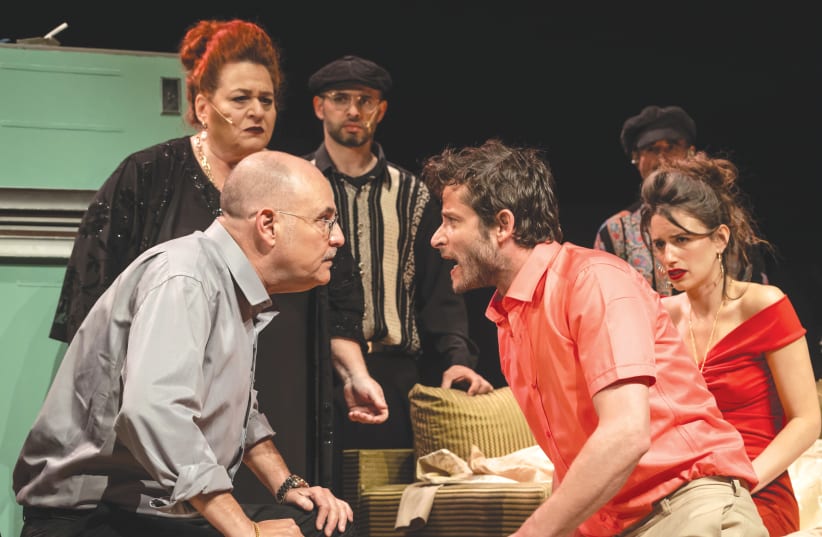In A Late Marriage, a theater adaptation of the same-titled 2001 hit movie by director Dover Kosashvili, Georgian wedding musicians joyfully enter the stage the moment it starts, and the audience begins to clap.
We soon meet Yasha (Zvika Hadar), a patriarch whose difficult son Zaza (Michael Aloni) is earning a PhD in philosophy and refuses to get married. His mother Lily (Esti Zakheim) protects him but also pushes for an introduction between her golden boy and a possible teenage bride. The girl, Ilana (Hila Shalev), is roped into this arranged relationship by her own family, especially her uncle Bessik (Ami Smolarchik).
The clash is between the norms of the old country, where such relationships were the ideal, and that of modernity – where young women are encouraged to attend college and explore before marriage. It is also a clash between Yasha, who utterly controls his son by financing his life, and Zaza, who resents the power money has over those around him and himself.
As a film, A Late Marriage had a tremendous impact. Nobody before Kosashvili dared to present the unsavory aspects of Georgian Jewish culture on screen. These included not only arranged marriages but also bridal kidnapping, violence, and a strict family code of honor. While previous comedies of that genre, like the 1973 movie Kazablan directed by Menahem Golan, showed the pains of immigration with an assured promise of future acceptance within a larger Israeli life, A Late Marriage doesn’t concern itself with such issues.
Adapting an influential film for the theatrical stage
One key factor in this was the Georgian language itself, which Moni Moshonov learned to play the part of Yasha and which was spoken for most of the film, further alienating the characters from the viewer. After it was released, Georgian cheese-filled Khachapuri bread and Pakhlava (our baklava) became trendy.
Directed by Shir Goldberg and adapted to the stage by Maayan Even, the sharp edges of this drama were honed down to make it more palatable. Hadar, a gifted actor with deep ties to his home city of Beersheba, first gained recognition as a television-friendly comedian.
In the film version, Yasha’s wealth is clearly crime related – and Moshonov depicts Yasha as a chilling gangster. This makes his own son’s fear of him realistic, and the few scenes when Yasha speaks Hebrew comical: a tough man robbed of language. In this retelling, money is how Yasha controls his family but its source is not revealed.
For the benefit of the audience, Hebrew is mostly spoken with a few Georgian words added. The production honors the language in a different way: Shalev sings beautifully well in it during the musical scenes created for this adaptation by Lior Ronen.
Hadar’s Yasha is not as fierce as the movie character, but he is deeply relatable. His talent for accents offered a similar broken Hebrew scene that made the audience laugh in appreciation.
Zaza has a love interest. Judith is a divorced Moroccan-Jewish woman who is older than him and has a kid. Played by the late Ronit Elkabetz in the film, this role is played by Yael Elkana for this production. Zaza pretends that he is a knight and Judith a witch. The irony is that she does attempt to use Sh’Chur, the North African Jewish tradition of sympathetic magic, to bind him to her with a love spell – she burns his underwear.
The discovery of this relationship by his parents ignites a fuse of rage and hurt.
“You are feeding this woman with our sweat!” Lily hurls at her son, who only a few scenes ago philosophized to Judith that money is like God in at least one sense – it exists because human beings believe in it.
What then, is more important: loyalty to one’s family or personal happiness? Could Zaza decide to turn his back on his own father for Judith’s love? Is the father really controlling him, or is it maybe his mother who prevents him from leaving?
During one key scene, Yasha (Hadar) asks Lily (Zakheim) if she loves him. In Fiddler on the Roof, a similar scene is played out between Tevye (Chaim Topol) and Golde (Maria Karnilova). In the 1964 American musical the saccharin-drenched answer is – yes. In this production, no such easy answers can be had. In that, the iconoclastic nature of Kosashvili’s work was kept in this highly entertaining summertime theater show.
‘A Late Marriage’ will be offered on Sunday, July 14, at 8 p.m. and run until Thursday, September 5, at 8 p.m. The Alaev Family inhabits the roles of stage musicians. Hebrew only. NIS 220 per ticket. Two hours long, no intermission. Roles alternate between actors; check the dates before booking. Shown at MUZA, Eretz Israel Museum. 2 Haim Levanon Street, Ramat Aviv, Tel Aviv. Call (03) 526-6666 for more info.













